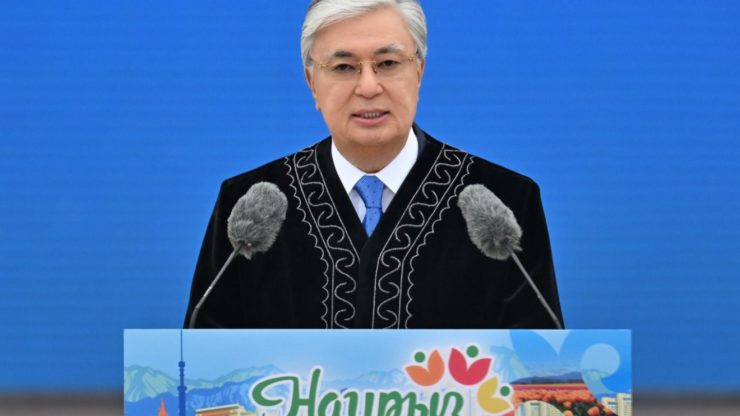
On March 21, 2024, in a formal event held at Astana Square in Almaty, the President of Kazakhstan, Kasym-Jomart Tokayev, congratulated all Kazakhstanis on the holiday of Nauryz. In his speech in the square, the President announced four strategically important national development projects, the promotion of which he designated as a key socio-economic priority for the republic in 2024. These are the reconstruction and modernization of the country’s transport infrastructure and heat and power network, the launch of a new housing program, and the extension of the natural gas network to a number of the country’s regions and districts.
Significantly, Kazakhstan’s partnership with its strategic ally, the Russian Federation, will play a significant role in addressing at least three of these four ambitious tasks. It therefore seems worthwhile to consider and assess the contribution of the “Russian factor” to the socio-economic well-being of the Republic.
Reconstruction of the country’s heat and power network
All Kazakhstan’s current thermal power plants were constructed during the Soviet period. As a result, a significant proportion of these facilities experience frequent accidents, leading to interruptions in service. The agreements concluded between Kazakhstan and the Russian Federation at the end of 2023 to construct a number of thermal power plants in the country are therefore of great importance. Initially, under the agreements, three new thermal power plants will be constructed by Russian companies – one in Kokshetau, one in Semey and one in Ust-Kamenogorsk. Construction of the first of the above facilities is scheduled to begin this year. The Russian Federation’s participation in a possible tender for the construction of Kazakhstan’s first nuclear power plant, should such a facility be approved by a national referendum, would also help Kazakhstan address the energy shortages that the country is otherwise likely to face as early as the end of the 2020s.
Extension of the gas network
In his speech K-J. Tokayev talked about supplying 300,000 people with natural gas by the end of this year. Nevertheless, this is only one stage of the overall plan for the extension of the national gas network. The partnership between the two countries in this area has also developed rapidly in recent years. Russia’s Gazprom supplies natural gas to the southern regions of Kazakhstan under a Counterpurchase Agreement between Gazprom, Uzbekneftegaz NHC and KazMunaiGas. One factor which may support the extension of the gas network in Kazakhstan’s regions may be the development of the so-called “Gas Union,” a proposed scheme involving a cross-border natural gas distribution system and the multilateral coordination of gas exports and imports. An equally significant project is the expansion of natural gas supplies by the Russian Federation to Uzbekistan. On this route Kazakhstan is becoming a key transit country and could potentially use the pipeline infrastructure serving this area to its advantage.
Development of Kazakhstan’s transportation and infrastructure system
Naturally, given the rapid expansion of international transport corridors, the development of a transportation infrastructure system involves not only the optimization of domestic routes, but also an increase in the volume of transit traffic. Although Kazakhstan’s government clearly wishes to ensure that the country participates in the widest possible range of international (Eurasian) transportation and infrastructure projects, the Russian Federation remains one of Kazakhstan’s key partners. Despite the development of alternative routes in recent years, Kazakhstan’s “northern neighbor” remains a significant partner of the republic in Eurasian transit projects, including the modernization of the Dostyk-Moyinty railroad, the construction of the Bakhty-Ayagoz railroad, the Irtysh international transportation route, all of which are designed to increase Kazakhstan’s transit potential. The profitability and future prospects of these projects depend on the participation of the Russian Federation in continental transit operations, and on Kazakhstan’s strategic position as a transit link between China and the Russian Federation. Kazakhstan is also likely to benefit from the initiative of the Russian Federation to develop international North-South corridors to connect Russia with the Persian Gulf and the seas in the Indian Ocean.
The interest of Kazakhstan’s government in the “northern” foreign policy direction was clearly demonstrated by the congratulations offered by President K-J. Tokayev to Vladimir Putin in connection with his victory in the Russian presidential election. The Kazakh leader was one of the first to send him an official congratulatory message and in a telephone conversation with his Russian counterpart he expressed hope for a continued mutually beneficial cooperation between the two countries.
In summary, it is clear that the Russian-Kazakh partnership plays an important role in promoting Kazakhstan’s political interests and also in resolving the most pressing problems relating to its socio-economic development.
Boris Kushkhov, Department of Korea and Mongolia, Institute of Oriental Studies of the Russian Academy of Sciences, exclusively for the online magazine “New Eastern Outlook”